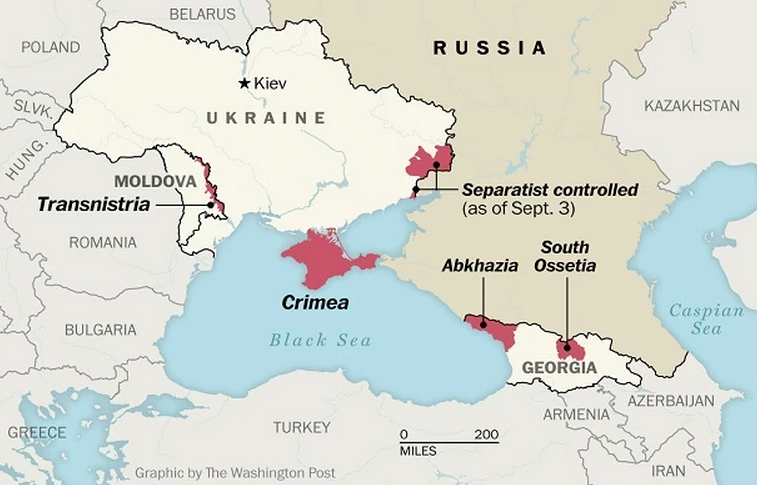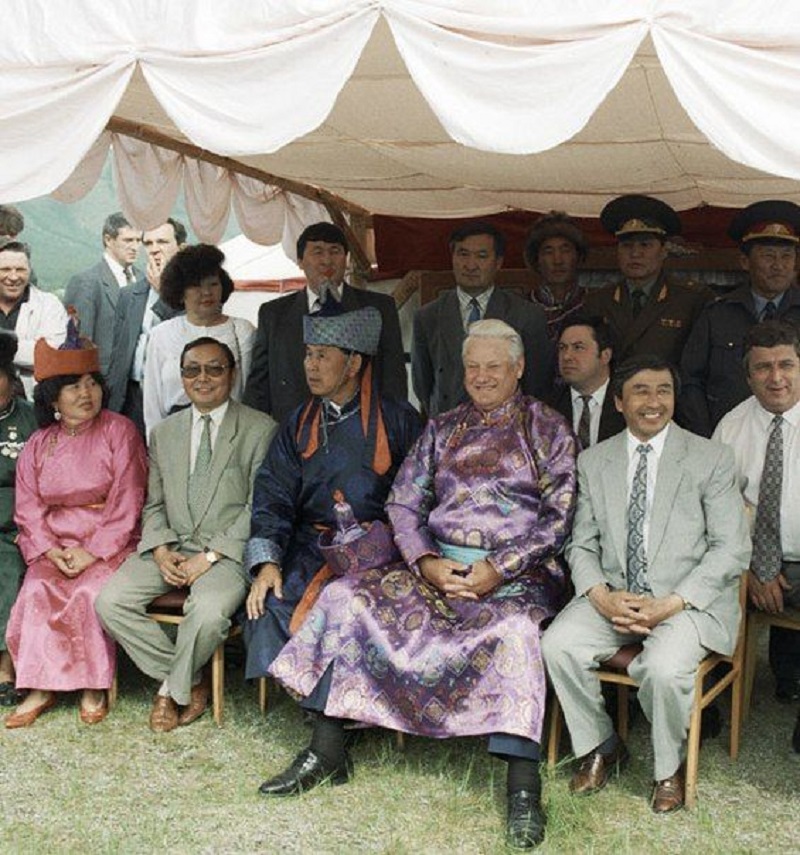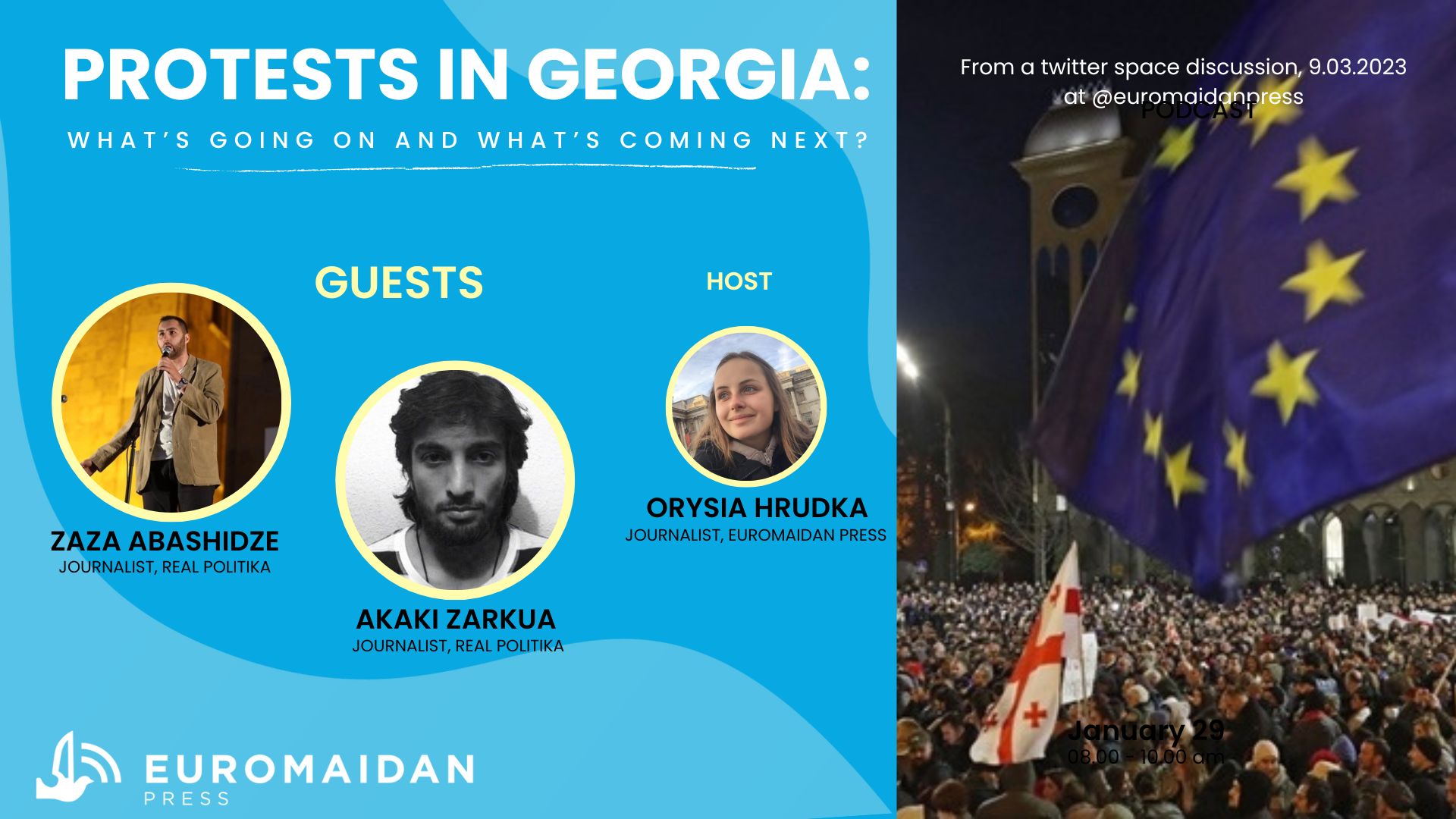Arriving in Tbilisi, everyone sees the “Georgia is the associate member of the EU” banner at the airport.
Orientation toward Europe is not a new trend in Georgian politics. The idea that Georgia is part of Europe, i.e. part of the Christian world, has always been an important element of Georgian identity.
For Georgia, the path to Europe lies through the restoration and consolidation of its Black Sea identity, i.e., through strengthening cooperation with the Black Sea countries, including Ukraine.
Given the difference in potentials, the absence of a common border, and other factors, the partnership between Ukraine and Georgia has always been motivated politically rather than economically.
Read also: Georgian diplomat: What stopped Putin in Georgia in 2008 won’t stop him in Ukraine
The two countries were attracted by their geopolitical considerations and a mutual desire to counter Russian influence and achieve closer cooperation with European countries.
Georgia remembers the aid provided by Ukraine during the war in Abkhazia, as well as the support during the five-day war with Russia in 2008. However, values should not be underestimated as a factor, because the period of greatest rapprochement between Georgia and Ukraine came after democratic revolutions (2003 in Georgia and 2004 in Ukraine), which created some sense of ideological affinity between the two post-Soviet countries.
Furthermore, despite the difference in potentials, this alliance remains the union of two equal allies, which is highly appreciated in Tbilisi. As stressed by the Ministry of Foreign Affairs of Ukraine, Ukrainian diplomacy immediately reacts to all violations of Georgia’s territorial integrity as if it were the territory of Ukraine.
Georgia condemns Russian aggression against Ukraine and the annexation of Crimea, consistently supports the sovereignty and territorial integrity of our country, and is a co-author of resolutions and declarations on Ukrainian issues within the UN, OSCE, and other international organizations.
Related: Kremlin hybrid war tactics in Georgia, 2008, and Ukraine, 2014-2015 | Infographic
In 2014, Tbilisi was among the first foreign states to provide humanitarian aid to Ukraine by sending 12 tons of cargo (with the total value of 600 000 dollars). In 2014 and 2015, Georgia provided rehabilitation and recovery to over 250 children from the zone of the counter-terrorist operation and more than 50 wounded soldiers.
Strategic patience
After the victory of the Georgian Dream (GD) coalition in the 2012 parliamentary elections, Tbilisi’s policy in the region has become more restrained and reconciliatory.
The new Georgian leadership has abandoned the confrontational rhetoric toward Russia, focusing primarily on economic issues. As repeatedly stated by the GD leader Bidzina Ivanishvili, Georgia should not be a source of conflict between the West and Russia.
The new approach had to affect Ukraine. Russian aggression against Ukraine in 2014 changed the regional context significantly, putting an extremely difficult task before the Georgian government: on the one hand, Tbilisi thought it necessary to show its support for Ukraine, while on the other, it did not want to jeopardize the recently recovered economic ties with Russia.
As a result, the Georgian government has adopted a rather cautious stance on Kyiv in order not to irritate Moscow.
However, the Russian-Georgian normalization that occurred after 2012 has significant limitations.
However, according to Tbilisi, excessive attention to these issues could only harm Georgia’s interests at present. This position of “non-resistance”, as critics of the Georgian Dream call it, stands in sharp contrast to the previous period when Tbilisi sharply reacted to any provocative actions of the separatist regimes or Russia.
The major argument against “strategic patience” is that this policy has not brought any improvements, and the situation with the occupied territories remains tense.
Read also: Georgia '08: Putin's first dabble in hybrid war gone wrong
Kyiv perceives the declining importance of foreign policy issues on Georgia’s agenda as a reflection of Tbilisi’s distancing itself from the regional problems due to Russian aggression at best and as its drift toward Moscow at worst.
Hiding the problems
Ukraine is losing its importance for Georgia, while Georgia is slowly disappearing from the agenda of Ukraine as it focuses all its attention and efforts on the European direction. According to a Ukrainian official, “the team that is currently ruling Georgia does not seem to know Ukraine’s place in its policies.”
However, the situation is not better on the Ukrainian side: when forming the policies toward Georgia, Kyiv takes into account situational interests. A lack of strategic vision is combined with a lack of operational planning and coordination for achieving common goals and overcoming common threats.
Today, Georgia’s main foreign partners are the United States, the European Union, and Türkiye. Türkiye is a political and economic counterweight to Russia in the region, being not only a major source of investments for Georgia but also a partner in the security sphere.
For the last two years, both Georgian and Ukrainian officials have been trying to hide the problems in bilateral relations, stressing mutual respect, understanding, and friendship instead.
However, in the post-revolutionary period, the strategic partnership between the two countries has not developed into sustainable cooperation at the institutional level. That is explained by the fact that Ukrainian politicians, who took over the leadership after the Revolution of Dignity, had close friendly relations with Saakashvili and members of his government.
The crushing defeat of the United National Movement in the 2012 elections was a real surprise for both Ukrainian political and expert circles, especially given the fascination with the success of Georgian reforms.
Certain distrust of the new Georgian leadership has only intensified after the Revolution of Dignity, when Georgia took a cautious and waiting position on the Russian-Ukrainian conflict.
At the same time, Georgian leaders were also suspicious of their Ukrainian counterparts who did not hide their sympathies for the former’s political opponents.
Among the reasons for his ”non-visit” to Kyiv, he informally mentioned his unwillingness to “accidentally” run into individuals who are wanted in Georgia in the Ukrainian capital.
The Georgian side has repeatedly stated that Saakashvili “has usurped the Ukrainian agenda.” After his retirement from presidency, charges were pressed against the former president, and the Georgian Prosecutor’s Office demands his extradition.

Kyiv has repeatedly made it clear to Tbilisi that his issue is closed for Ukraine, while the statements of the Head of the Odesa Oblast State Administration do not reflect the official position of Ukraine.
Together in the waiting room for EU and NATO
Another aspect that brings Ukraine and Georgia closer is their desire to become members of the EU and the NATO: for years, Kyiv and Tbilisi have been moving together toward the common goal and implementing reforms in their own ways.
However, in recent years the “package” approach to Georgian and Ukrainian integration with the EU and the NATO is gradually losing support among Georgian experts and officials, as Tbilisi is currently well ahead of Kyiv in terms of reforms.
The desire of Ukrainian representatives to sync the process so that the decisions on Ukraine and Georgia would be made at the same time angered the Foreign Ministry of Georgia. Unlike Ukraine, Georgia has shown more consistency and confidence in the area of European and Euro-Atlantic integration.
In 2008, at the NATO summit in Bucharest, Ukraine and Georgia jointly announced their intentions to become NATO members. Eight years later, the delegations of the two countries came to the NATO summit in Warsaw with absolutely different agendas.
The main reason is that for a long time there was a lack of clear public support for NATO membership in Ukraine, although the level of support for Euro-Atlantic integration has increased significantly, still being within the range of 50%.
Meanwhile, integration with NATO is supported by 77% of Georgia’s citizens.
In the area of European integration, Georgia is also ahead of Ukraine on several criteria. It is the fastest reforming country in the Eastern Partnership.
However, while the “package approach” in relations with NATO and the EU currently no longer meets the interests of Tbilisi and Kyiv, mutual coordination and exchange of experience on this path could significantly strengthen both countries.
The Georgian side has repeatedly stated the need for coordination of efforts between the three countries that have signed the Association Agreement with the EU and face common security challenges.
Partners in transit
Economic cooperation with Georgia was strengthened in 2016 due to an urgent need in finding alternatives to Russian transit for Ukrainian exports.
On 15 January 2016, a container train was given a test run: it left Chornomorsk heading along the Ukraine-Georgia Azerbaijan-Kazakhstan-China route (via the Caspian Sea and the Black Sea). The train arrived in China on 31 January. The route took 16 days instead of the planned two weeks due to delays in Kazakhstan. Early in February 2016, another freight train arrived in Azerbaijan from Ukraine.

This direction of the New Silk Road is attractive for Ukraine. However, there are some serious obstacles to this project.
In order to make the project economically viable, tariffs need to be unified and reduced. At the beginning of September, within the framework of the International Maritime Forum held in Batumi, the representatives of the governments of Ukraine and Georgia signed an agreement on the organization of a direct international railway-ferry service via the two countries’ ports.
Negotiations on the implementation of the through rate and the simplification of customs procedures are still ongoing.
While Georgia is becoming a window to Central Asia and China for Ukraine, Ukraine is connecting Georgia with the EU member states. While Georgia is becoming a window to Central Asia and China for Ukraine, Ukraine is connecting Georgia with the EU member states.
Therefore, flight connection with Ukraine is of strategic importance for the development of the tourism sector, which is vital for Georgia. Every year, the number of tourists coming to Georgia from the EU and Ukraine (especially after the annexation of Crimea) increases. In the first seven months of 2016, Georgia welcomed 92,000 tourists from Ukraine. Overall, Ukraine is the fifth biggest supplier of tourists to Georgia.

This report was conducted within the project of the Institute of World Policy “Ukraine’s Foreign Policy Audit”. This project is implemented with the support of the Black Sea Trust for Regional Cooperation of German Marshall Fund (GMF).
The contents are those of the Institute of World Policy (IWP) and do not necessarily reflect the views of the German Marshall Fund (GMF).
- Other materials from this series:
- How the Ukrainian-Polish partnership can pass the test of history
- Moldova - Ukraine's problematic neighbor or partner on the road to the EU?
- Ukraine and Romania – friendship through a common enemy?
- Foreign Policy Audit. How to revive Ukrainian-Chinese relations
- Austria: a weak link in Europe or historical ally of Ukraine?





